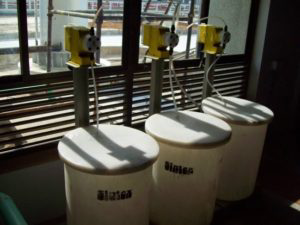Boiler Water Chemicals
Boiler chemicals for water treatment are used to generate steam. The primary function of the boiler is to transfer heat from hot gases produced through burning fuel to the water until it is hot or turns into steam.
The boiler feed water is typically contaminated with impurities that can affect boiler performance and effectiveness. Because a significant portion from steam’s gaseous the water gets an abundance of concentrated salts as well as other impurities.
Also Read: Air Pollution Control Equipment
They are typically Mg or Ca salts that, when concentrated of deposits, scales or other forms. They are extremely harmful to the boiler because of them affecting heating process and can cause heating, and ultimately the rupture of the boiler.
Boiler Manufacturing Corporation Chemical additives are designed to fix the problems caused by these impurities. To improve the quality of feed water, and steam purity. These chemicals are injected directly into the feed water, or steam.
Water treatment for boilers is an industry-wide water treatment that focuses on the elimination and chemical alteration of drug that could be detrimental to boilers.
Checkout: Importance of Steam Accumulator in Boilers
Benefits of Thermodyne Boiler Water Treatment Chemicals
- Increase boiler potency
- Reduce fuel, in operation and maintenance prices
- Minimize maintenance and period
- Protect instrumentality from corrosion and extend instrumentality period.

Thermodyne is leading Boiler Water Treatment Chemicals Manufacturers in India, these services use by Food, Cement and Power Plant Industries.
Also Read: Key Skills for Mechanical Engineer
https://contentupgrade.me/2ypMgB4D
Save
Water Treatment Chemical Manufacturers for Boilers in India FAQ
1.What are boiler water treatment chemicals?
Boiler water treatment chemicals are chemicals that are used to prevent the formation of scale and corrosion in boilers. They can also help to improve the efficiency of boilers and extend their lifespan.
2.What are the different types of boiler water treatment chemicals?
There are many different types of boiler water treatment chemicals, but some of the most common include:
Scale inhibitors: Scale inhibitors prevent the formation of scale by coating the surfaces of pipes and other components in the boiler.
Corrosion inhibitors: Corrosion inhibitors prevent the oxidation of metal surfaces in the boiler.
Oxygen scavengers: Oxygen scavengers remove dissolved oxygen from the boiler water, which can cause corrosion.
pH control agents: pH control agents adjust the pH of the boiler water to a level that is optimal for preventing scale and corrosion.
3.How do I choose the right boiler water treatment chemicals?
The type of boiler water treatment chemicals that you need will depend on the type of boiler you have, the water quality in your area, and the operating conditions of your boiler. It is important to consult with a qualified boiler water treatment specialist to choose the right chemicals for your specific needs.
4.How often should I add boiler water treatment chemicals?
The frequency with which you need to add boiler water treatment chemicals will depend on the type of chemicals you are using, the water quality in your area, and the operating conditions of your boiler. It is important to follow the instructions that come with the chemicals you are using.
5.What are the benefits of using boiler water treatment chemicals?
There are many benefits to using boiler water treatment chemicals, including:
Preventing the formation of scale and corrosion
Improving the efficiency of boilers
Extending the lifespan of boilers
Reducing maintenance costs
Improving the safety of boilers
6.What are the risks of not using boiler water treatment chemicals?
If you do not use boiler water treatment chemicals, you may experience the following problems:
Scale buildup: Scale buildup can reduce the efficiency of boilers and can eventually cause them to fail.
Corrosion: Corrosion can damage the metal components of boilers and can eventually cause them to fail.
Reduced water quality: The water in boilers that are not treated with chemicals can become contaminated with bacteria and other harmful organisms.
Increased maintenance costs: Boilers that are not treated with chemicals may require more frequent maintenance, which can increase costs.
Reduced safety: Boilers that are not treated with chemicals may be more likely to fail, which can pose a safety hazard.
7.How can I prevent boiler water treatment chemicals from harming the environment?
There are a few things you can do to prevent boiler water treatment chemicals from harming the environment:
Use the right amount of chemicals: It is important to use the right amount of chemicals to treat boiler water. Using too much chemicals can be harmful to the environment.
Dispose of chemicals properly: When you are finished using boiler water treatment chemicals, it is important to dispose of them properly. Do not pour them down the drain or onto the ground.
Choose environmentally friendly chemicals: There are a number of environmentally friendly boiler water treatment chemicals available. These chemicals are less harmful to the environment than traditional chemicals.
8.Where can I buy boiler water treatment chemicals?
Boiler water treatment chemicals are available from a variety of sources, including:
Boiler supply companies
Hardware stores
Online retailers
9.How much do boiler water treatment chemicals cost?
The cost of boiler water treatment chemicals will vary depending on the type of chemicals you are using, the amount you need, and the source from which you purchase them. In general, boiler water treatment chemicals are relatively inexpensive.
10.What are some tips for using boiler water treatment chemicals safely?
Here are some tips for using boiler water treatment chemicals safely:
Always read and follow the instructions that come with the chemicals you are using.
Wear protective gear, such as gloves and goggles, when handling chemicals.
Store chemicals in a safe place, out of reach of children and pets.
Dispose of chemicals properly.





